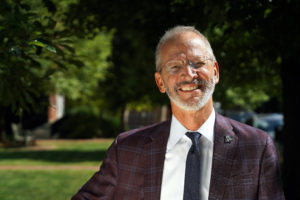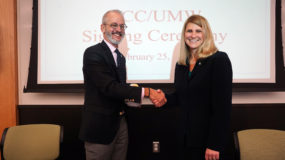A message from the President’s Task Force.
Colleagues,
This is the third in a series of weekly communications with the campus community from the COVID-19 Task Force. There have been several developments over the past week that are important to share.
First, the Task Force has completed an initial draft of the University’s “return to campus plan” and we anticipate refining it over the next few days. The plan outlines “gating conditions” or prerequisites for a return to campus, as well as detailed recommendations for repopulating the campus, monitoring and containment. It also includes a comprehensive technology plan as well as budget estimates for many of the costs necessary to support health and safety as part of instruction on a residential campus.
We are, however, in a bit of a holding pattern at this point, as we await the guidance of the state-wide education task force which is also completing its work. We anticipate receiving appropriate guidance from the Governor’s Office on or about June 9. We have also learned that our plan, which will need to align with the Commonwealth’s expectations, will then need to be reviewed by both the State Council of Higher Education for Virginia (SCHEV) and the Virginia Department of Health (VDH). While it is our hope that this process will be expedited, it may, unfortunately, constrain our ability to finalize and share the plan more widely.
That said, we are able to share some of the decisions around which we have consensus. For example, consistent with CDC guidance, face coverings will be a critical piece of our return to campus. We will also modify the academic calendar to hold classes on Labor Day, cancel Fall Break, and move to remote instruction after Thanksgiving. The best information we have tells us that minimizing, as much as possible, the back and forth of travel for breaks can make a difference in reducing transmission; a notion explained by Dr. Anthony Fauci in an interview with the Chronicle of Higher Education this week. These adjustments will be reflected in the official calendar and posted in the Office of the Provost in the coming days.
Second, the Virginia Department of Human Resource Management (DHRM) has issued guidance on workplace safety which is being adapted by the Office of Human Resources for application to UMW. Executive HR Director Beth Williams will be sharing this guidance along with directions for every office to begin to develop its individual return to work plan. While there are many elements of our plan that will be standardized and uniform across campus (e.g. signage, face covering expectations, and social distancing requirements), there are others that will be unique to individual units. The expectation is that supervisors would start developing those plans soon and submit them for feedback from the Task Force. More information about timelines and a template for what to include will be communicated through our HR office.
As always, if you have thoughts, concerns, or questions, don’t hesitate to reach out to us or other members of the Task Force.
Jeff McClurken and Tim O’Donnell
Members of the President’s Task Force

